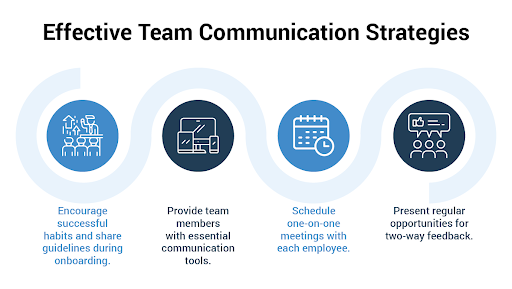Your organization’s success depends on the combined efforts of all its employees. Whether you’re looking to improve your stakeholder engagement or reduce your yearly operational expenses, you need everyone on the same page to maximize your results. That’s why, as a manager, building a cohesive team is so important.
In this guide, we’ll share several tips for building and nurturing a team of employees who are driven to go above and beyond in their roles:
- Hire with workplace culture in mind.
- Emphasize strong team communications.
- Celebrate accomplishments together.
- Adopt an improvement mindset.
Developing a shared commitment to collaboration, trust, and accountability among your employees will improve retention and boost productivity in the long run. Employ the right strategies, and you’ll be well on your way to cultivating your next all-star team.
1. Hire with workplace culture in mind
A strong team needs a strong foundation, which is why hiring is so critical. When an employee joins your team, they’re not just fitting into your existing workplace culture—their attitude, decisions, and actions will help shape it over time. The more they are aligned with your overall goals, values, and long-term vision, the better able they’ll be to contribute to your organization’s success.
This doesn’t mean you’ll be assembling a team of cookie-cutter individuals who think and act alike. Evaluate how each applicant can add to your culture, whether that’s through their way of thinking, former job experience, or personal background.
Keep these considerations in mind to identify promising candidates who will benefit your workplace culture:
- Start by identifying specific traits and behaviors that characterize your culture.
- Infuse your workplace culture into job descriptions and other applicant-facing materials.
- Be open to candidates from different socioeconomic and cultural backgrounds.
- Ask interview questions related to your workplace culture to hear new perspectives.
To many hiring managers, screening and interviewing potential new hires can seem like a demanding, drawn-out process. By incorporating deliberate steps to assess how each candidate will support your workplace culture, you’ll be able to make quicker, more confident decisions and reduce your time to hire. This means that you can secure more top talent for your team and reduce your costs of vacancy.
2. Emphasize effective team communications
Since each of your employees has their own tasks and duties related to advancing your goals, you need to promote open, frequent communication to ensure that everyone stays in the loop. Several impactful strategies for improving your team communications include:

- Encouraging successful habits early during onboarding. Make new hires feel welcome and supported by pairing them with a mentor on the team. This way, they can get comfortable with reaching out to their peers with questions, concerns, or feedback. In their onboarding packet, include specific communication guidelines and protocols so they know what to expect moving forward.
- Providing team members with communication tools. Especially if you have hybrid or remote employees who aren’t always a desk away from their colleagues, ensure that team members have everything they need to communicate effectively. Slack, for instance, is one tool that allows instant messaging, file sharing, and video calls all on one platform.
- Scheduling one-on-one meetings with each employee. To minimize competition and conflict within your team, consider holding weekly one-on-one meetings with each team member. These meetings allow you to learn more about their individual experiences and perspectives while reinforcing how connected they feel to your organization.
- Presenting opportunities for two-way feedback. Address challenges promptly and empower your employees by developing a system for receiving and providing regular feedback. Your one-on-one meetings are perfect occasions for discussing performance and seeking ideas or input from your team members.
Additionally, make sure to regroup with your team members on any project updates, new policies, or strategy changes when they occur.
For example, let’s say you’re a manager at a mid-sized nonprofit that has just finalized its latest strategic plan, and one of your main focuses for the next few years is adopting more sustainable practices. To ensure that every one of your staff members knows how they can individually contribute, you could hold a meeting to walk through concrete steps, such as turning off lights when not in use, recycling, and printing on both sides of the paper.
3. Celebrate accomplishments together
Create rewarding and fulfilling experiences for your team members by celebrating completed goals or projects. Recognition is one of the most effective employee engagement strategies because it helps employees understand the value of their hard work.
There are several meaningful ways to acknowledge accomplishments, such as:
- Awarding small gifts, such as a gift card or a branded t-shirt.
- Spotlighting your team’s performance on social media.
- Hosting a dedicated appreciation event.
Additionally, you can pave the way for stronger connections between your team members by opening up opportunities for peer-to-peer recognition.
For example, put up a recognition board in the office so employees can add shoutouts to their colleagues. Or, consider designing eCards that they can personalize and send whenever they want to express their appreciation for another team member. Developing a culture of gratitude within your team reinforces excellent performance and keeps employees motivated in their day-to-day activities.
4. Adopt an improvement mindset
Building a cohesive team is not a destination, but an ongoing journey. Therefore, as a manager, it’s important to keep an eye out for new ways to foster collaboration and trust among your employees. In fact, there are plenty of expert resources available for improving management skills such as recruiting the right people, setting expectations, and keeping your employees engaged.
Depending on your organization’s goals and resources, you can engage in a variety of learning formats to stay informed on the latest best practices for building effective teams, including:
- Conferences and workshops
- Live training programs
- Podcasts and webinars
- Asynchronous online courses
A successful workplace encourages and depends upon innovation. By tapping into opportunities to evaluate your current management practices and learn new methods for team building, you’ll be able to help your team reach its fullest potential.
As you implement more tips and strategies into your management approach, assess the effectiveness of your efforts by monitoring metrics such as your employee retention rate. Send out an employee engagement survey at least once a year to gather their direct input on how supported and productive they feel in their team.
For instance, you might find out that it took several employees a while to grasp your organization’s values and team expectations when they first started. With this in mind, you could incorporate more detailed messaging during the applicant process to create a smoother transition. By acting on specific feedback from your employees, you’ll be able to make improvements that resonate with their individual preferences and needs.
—
Featured Guest Expert – Danielle Rocheleau, C.Dir.,CEO, Laridae
 The foundation of Danielle’s professional experience, career, and passion has been rooted in community development.
The foundation of Danielle’s professional experience, career, and passion has been rooted in community development.
Prior to consulting, she held executive roles with the Greater Peterborough Innovation Cluster (GPIC) and Peterborough & Kawarthas Economic Development (PKED). While in those roles, she facilitated international partnerships in agricultural and environmental research at Trent University with the aim of driving commercialization and a local innovation economy, as well as managed the business advisory centre (BAC) offering guidance to small businesses. As a result of her work with GPIC, Danielle worked diligently with partners which resulted in $35 million invested in research locally, a number of international partnerships in Japan and across Europe, the beginnings of research centres in biomaterials and small ruminants, and over 100 new jobs.
Danielle has an educational background in Mass Communications from Laurentian University and Public Relations from Cambrian College. She recently completed her Chartered Director (C.Dir.) program at McMaster University. Bilingual, Danielle is originally from Timmins.











